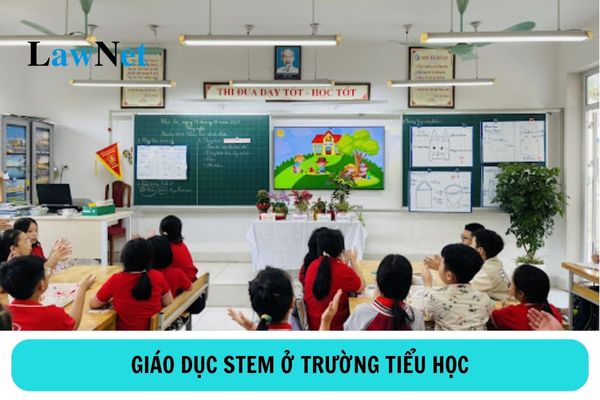Vietnam: Will STEM education be applied in all primary schools from the 2024-2025 academic year?
What is STEM education in Vietnam?
According to the guidelines in sub-section 1 Section 2 Official Dispatch 909/BGDDT-GDTH in 2023, STEM education is an educational method primarily based on integrated teaching, creating opportunities for students to mobilize, aggregate knowledge and skills in the fields of Science, Technology, Engineering, and Mathematics to develop qualities, competencies, and solve real-life problems effectively.
When applying STEM education, integrating additional elements of arts and humanities (Art) in some subjects/educational activities in the program is encouraged to expand and enhance the effectiveness of practical education, and cooperation in various ways to promote creativity, aesthetics, curiosity, and empathy among students (implementing STEAM education).
Will STEM education be applied in all primary schools in Vietnam from the 2024-2025 academic year?
According to the guidelines in sub-section 6 Section 1 Part B Official Dispatch 3898/BGDDT-GDTH in 2024 as follows:
Application of STEM Education
Organize the application of STEM education in approaches oriented by the General Education Program as guided by the Ministry of Education and Training (MoET)[19] with the following specific requirements:
Provinces and cities develop plans to apply STEM education in all educational institutions implementing the Primary Education Program in the locality, ensuring quality and regulatory requirements.
Focus on organizing training, guiding schools in developing implementation plans, organizing thematic conferences, assessing, summarizing, and drawing lessons to ensure the quality, effectiveness, and practicality of STEM education implementation in educational institutions.
Strengthen consulting with the provincial People's Committees to direct provincial departments and authorities, and district-level localities to allocate funds, equip infrastructure to ensure effective STEM education implementation in local educational institutions according to local conditions and regulations; effectively carry out propaganda to raise awareness among managers, teachers, parents, and students about the role of STEM education. During the implementation process at the local level, guide teachers to effectively use learning resources at the website https://stemtieuhoc.edu.vn and organize the selection of materials and resources according to regulations[20].
Thus, one of the educational tasks for the upcoming 2024-2025 academic year is to apply STEM education widely.
The Vietnam Ministry of Education and Training requires the Departments of Education and Training of provinces and cities to develop plans to apply STEM education in all primary schools in the locality, ensuring quality and regulatory requirements.

Will STEM education be applied in all primary schools in Vietnam from the 2024-2025 academic year? (Image from the Internet)
What are the forms of organizing STEM education in Vietnam?
According to sub-section 2 Official Dispatch 909/BGDDT-GDTH in 2023, the forms of organizing STEM education are as follows:
(1). STEM Lessons
Teaching subjects through STEM lessons is a form that implements integrated or interdisciplinary teaching. This is the main form of STEM education implementation in schools to effectively achieve for the Primary Education Program.
The content and requirements to be achieved in STEM lessons closely follow the required outcomes of subjects/educational activities in the Primary Education Program.
The duration of implementing STEM lessons is built based on the duration of subjects/educational activities related to STEM lessons scientifically, flexibly, appropriately to the student's developmental psychology, without overburdening students and teachers, and is reflected in the school's educational plan according to regulations.
The implementation progress of STEM lessons is based on the engineering design process or science discovery process with learning activities appropriate to students and using primary education teaching equipment according to MoET's regulations, along with students' learning tools in subjects/educational activities, materials, and easily available supplies for teachers and students.
The use of supplementary digital resources, virtual experiments, simulations, and software easily accessible for use inside and outside the classroom is encouraged to help students learn proactively.
Student assessment in STEM lessons is conducted per the assessment regulations of the Primary Education Program.
Based on the requirements to be achieved in STEM lessons, teachers evaluate students using primary methods such as observation, interview, assessment through learning profiles, students' products, and activities. In the assessment, attention should be paid to continuous assessment to encourage students' progress, creating confidence and interest in learning.
(2). STEM Experiential Activities
STEM experiential activities are a form of organizing STEM education through STEM clubs, STEM days, STEM learning projects, or STEM experiential activities in real-world settings at suitable locations according to the objectives, interests, talents, and aspirations of students to create enthusiasm and motivation for learning, contributing to the development of competencies, qualities, and nurturing students' passion and talent.
STEM experiential activities are built into the school's educational plan, suitable to the conditions of educational institutions and local realities.
STEM experiential activities are designed based on interdisciplinary integrated teaching, addressing multiple fields requiring students to mobilize comprehensive knowledge and skills to propose effective, flexible, and creative solutions to real-world problems.
The space and time for implementing STEM experiential activities can extend beyond the school's premises (production facilities, universities, research institutes, etc.), beyond regular class time/educational activities.
(3). Familiarizing with Scientific and Engineering Research
Familiarizing with scientific and engineering research is a form of organizing STEM education activities for students with talents, interests, and initial enthusiasm to explore and engage with scientific and technical research to solve real-world problems.
Through the process of teaching STEM lessons and STEM experiential activities, teachers identify talented students to nurture and facilitate their familiarity with scientific and engineering research.
Educational institutions organize STEM education activities to give students opportunities to familiarize themselves with scientific and engineering research in the form of individual or group research projects under the guidance of one teacher, a group of teachers, or cooperating with other related social forces (such as family, production facilities, universities, research institutes, science centers, experts, artisans, scientists, etc.).
Based on reality, educational institutions can organize STEM experiential activities, and scientific and technical research exchange festivals at the unit to select research projects participating in scientific and technical research playgrounds suitable for primary school students.

